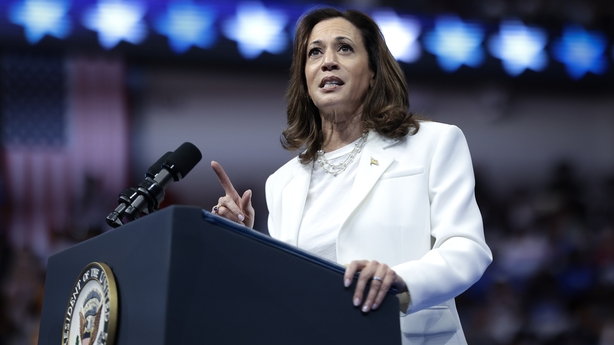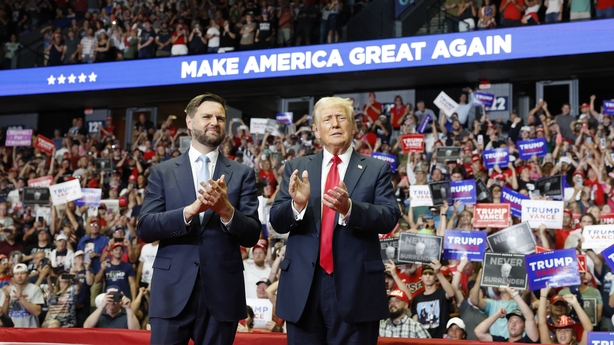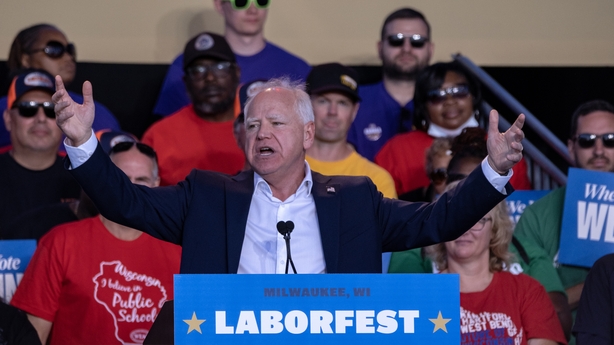The US was a happier place last weekend, because the National Football League is back.
The nation's number one sport has been off TV screens (and unavailable in stadiums) since 11 February Superbowl. That changed on Thursday night with a cracking game between the reigning champions, the Kansas City Chiefs (yes Taylor was there), and our neighbours up the road, the Baltimore Ravens.
It all came down to one pass to the endzone with three seconds left on the clock. Baltimore's standout tight end caught the ball with an athletic leap, and put two feet down inside the endzone, as per the rules. A kicked point after would have tied the game, but a two-point run in from five yards would win it, in a sensational upset.
But it was not to be. A replay of the catch showed that half of the Baltimore player's big toe was on the whitewash marking the end of the endzone. The catch was ruled out of bounds, and Kansas City won (again).
The Ravens were THIS CLOSE to scoring the game-tying touchdown 👀#Kickoff2024 pic.twitter.com/08KjTVFHQZ
— NFL (@NFL) September 6, 2024
So, what's this got to do with the Presidential debate between Donald Trump and Kamala Harris? Allow me to stretch a metaphor (cracks knuckles and resumes typing).
American Football is often described as a game of inches. Sure, we foreigners know it as a game in which the ball is thrown high and long downfield for someone to catch spectacularly.
The so-called "air" game is the defining feature of American football. It also has a counterpart "the ground game", in which a man runs with the ball while trying to avoid being jumped on by 11 other men. Sometimes he gets away; mostly he gets stomped.
But the really key decisions - the things on which many a game turns - come not from the spectacular gains or reversals of the air or ground games, but from the unlovely grinding of the game of inches. Exhibit A: The length of a Baltimore player's big toe.
Or, more pertinently to Tuesday’s debate, the kind of unseemly heap of bodies that usually results when a referee calls "fourth and inches".
Because this presidential election is now a "game of inches". Both candidates have probably hit the ceiling of natural support bases for their respective parties, having wrung all they can out of their "air games" of televised conventions, advertising and social media: It's all-brand maintenance from now on.
The Kamala Harris surge of August was more a reversion to the mean for the Democrats, coming back from the depths of the Biden unpopularity to float now at about the level of natural support for the party.
The same is probably true of Donald Trump, whose support in the opinion polls has been remarkably consistent during the year. Both are within the margin of error of each other. And both are short of the kind of voter surge that would put them decisively over the line on 5 November.
Just as American football is a highly complex, highly technical game played by specialists, so too is a presidential election campaign - where the rules are not always obvious, especially to foreigners like us. Notably the requirement to win a majority of votes in the Electoral College, not necessarily a majority of votes in the country as a whole.
This is why it is important to concentrate on what is happening in the battleground states - the half-dozen or so states where the election will be won and lost.
Last time the gap between Biden and Trump was seven million in the popular vote - but the three states that could have put Trump back in the White House were decided by 48,000 votes combined. In a country of 330 million people, that is the definition of the game of inches.

And so, it is this time. Everything that Trump/Vance and Harris/Walz say, do and imply from now on are about nabbing a few thousand voters here and there in the battleground states - closely targeting small-ish voter groups (in national terms) to add to the locked-in party base votes each already has in the bag.
Consider this: On Friday CNN analysis of the polls said if Harris gets the national numbers she is getting today she will win with 292 Electoral College votes. But if Trump improves his polling by just one percentage point, he will win with 287 Electoral College votes (the winning line is 270 votes). One percent.
Building that one percent is done issue by issue, in the states where they count. For example, the reaction to the High School shooting in Georgia on Wednesday. Another appalling incident facilitated by the way-to-easy access to high-powered rapid-fire weapons teenage boys have in this country.
There is a very high degree of consensus among Republican and Democratic Party voters about tightening laws to make it harder for teenage boys to get their hands on military-style weapons. But it's detailed stuff – incremental, needs explaining: and when you are explaining you are losing.
Much easier to say as little as possible during the election period. Especially in Pennsylvania, where there are a lot of gun loving folk. Easier to say - as Trump did in Harrisburg, the state capital, last Wednesday, that Kamala Harris is going take away your guns. She isn't - she can't - but it's one more piece of voter segmentation in the campaign. It may drive a few thousand, maybe even a few hundred votes to Trump that might have voted for Harris.
Read More:
Harris 'accepts microphones rule' for Trump debate
Trump struggles to keep media spotlight in battle with Harris
Even though a troubled young man with an assault rifle came within millimetres of ending Trump's life in July in Pennsylvania, he is not going to go looking for restrictions there or elsewhere because it might cost him a small number of voters.
The same for Harris - she is not going to go out on a limb over gun control (even though she supports it, even though Tim Walz is a well-known convert from second amendment stalwart to gun control advocate because of high school shootings). The electoral consequences are so great given the relatively small number involved that it's just not worth it. A game of inches.
Electric cars is another issue that Trump is using to lasso a few thousand voters - this time automobile workers in Michigan. His attacks on electric cars are not so much against the cars themselves, but as a way to unsettle auto workers around the Detroit region and try to persuade them to switch to him in the hope of hanging onto their job in an engine or exhaust pipe factory.
The auto workers union has endorsed Harris, and Biden before her (that's why Joe Biden went out on a UAW picket line in Michigan last year), but no union can control the way its members vote, and fear of job loss can be a great motivator to switch allegiance to a candidate. In the game of inches, these small things count.
So where does the debate fit into the game of inches scenario? Well, it's got all the hallmarks of the "air game", the big spectacular, live from the constitution museum in Philadelphia's old city quarter. It's the only scheduled debate between them, and it's sure to get a big TV audience.
Just as the NFL dominates television ratings - 93 of the top 100 TV shows last year were NFL games - so too do the Presidential election set pieces. Both candidates outscored the average NFL match in the TV ratings for their convention speeches by about ten million viewers - really good, but far short of a Superbowl audience.
No doubt both candidates would like to land a spectacular score on their opponent, establish themselves as the top quarterback for the nation.
But I suspect the imperatives of the game of inches may take priority, which means surviving the debate intact in order to grind out a win through the ground game of going house to house to get the vote out come November will be more important than throwing a "Hail Mary" pass to the endzone on Tuesday political football.
Think of how many juicy sporting ties you have seen down the years that look so appealing on paper, only to end up as boring, grinding, tactically negative affairs where the overarching object is to stop the other side winning, not to score a decisive victory?
Yes, Champions League round robin, I am looking at you. If you are old enough to remember Jack Charlton, you are old enough to remember the real meaning of the word "result". It ain’t pretty.
Donald Trump probably has a bigger incentive to go big in the debate than Kamala Harris. He knocked Joe Biden out of the race in the first debate and may be tempted to try and do the same to Harris. The danger is that he tries too hard to finish her off and exposes himself to greater danger.
Trump's campaign team are highly regarded professionals, and they know all this. They have been arranging practice sessions for Trump with Tulsi Gabbard, the former Democratic congresswoman, Iraq war veteran and candidate in the 2020 Democratic party primaries.
She eventually backed Joe Biden in that race, but since leaving Congress in 2022 has become increasingly conservative and now endorses Trump. So, she has the background and experience to "play Kamala" for practice.
JD Vance, his running mate, was asked about debate preparation at a campaign stop in Phoenix, Arizona (a battleground state) on Thursday: "We're constantly trading ideas and trading, you know, war stories from the campaign trail about what we're hearing and what we're seeing. But no, we're not going to have some formal debate prep session because Donald Trump doesn't need it. Donald Trump actually knows what he believes, and he knows his record. And that's all he really has to talk about."

It is certainly true that Trump is comfortable talking (at great length) about his views and policies, as was seen again this week in an interview with Fox host Sean Hannity in front of a live audience of mostly blue collar families an arena in Pennsylvania on Wednesday, and at the Economic Club of New York on Thursday, saying essentially the same thing but with a moderated tone in front of New York’s banking and business elite.
Friday it was up to New York for an unscheduled appearance at the opening of his appeal against the $5 million civil fine in the E Jean Carroll case. (He closed the week with a tactical win in the New York criminal fraud trial, in which sentencing has been put back from 18 September to 26 November, after the presidential election).
Trump has taken a "game of inches" approach to his legal troubles, not just in recent years but throughout his life. He has been able to grind his way back from seemingly impossible positions time and again. That muscle memory and experience will help in this presidential campaign as well. He is less likely to be damaged by the debate than Kamala Harris.
Everyone knows who Trump is, nobody is surprised when he says something outrageous, stupid, offensive or plain wrong. We have seen him so much. He is more a phenomenon than a person. Who he is and what he stands for is pretty much baked in now. It's just the marginal votes in a half-dozen swing states that he needs.
That's why Kamala Harris keeps saying she is the underdog. She is.
She has been working intensively on her debate preparation for several weeks now, scaling back the campaign work this week to go through more training sessions. Her big disadvantage is that while everyone knows pretty much all they need to know about Trump, she is still a comparative mystery.
How she performs in the debate matters much more for her than it does for Trump. She is the one who has to prove herself, but like Trump, if she over-reaches, it could be her downfall. And there isn't much time to recover.
Which is why I'm plumping for a nil-all draw. There is too much at stake in the game of inches - which will go on until 5 November - for either one to risk losing with a failed long bomb on a Tuesday in early September.
Tim Walz may have a hand here too. Harris keeps calling him "Coach Walz" at rallies. In his high school in Minnesota, he coached the linebackers - fierce creatures who hunt down anyone carrying the football and stop them in their tracks.
At the same rallies, Walz has told the crowd their job is to go "blocking and tackling" for Harris in their neighbourhoods. In other words, do the hard yards work of getting the vote out. Street by street, house by house, voter by voter. This is classic "game of inches" grind it out football/political campaigning.

Kamala Harris needs to show the public she is a competent quarterback, capable of matching Donald Trump play for play. But she doesn't need to try to win the game in the first quarter. Surviving to the fourth quarter is more important. In the game of inches, you have to keep the drive alive, and hope everyone's toes are on the right side of the whitewash.
A few stats to finish: This Presidential contest is so close that once again a candidate could win the popular vote and lose the electoral college vote (or vice versa!). It happened to Al Gore in 2000, to Hilary Clinton in 2016 and only 48,000 votes spread over three states stopped it happening to Joe Biden in 2020. For the third time in seven consecutive elections, we could see this "inversion" happen again.
But as Taegan Goddard of Political Wire has pointed out, this kind of "inversion" is extremely rare in US electoral history. It happened three times in the 19th century, then there was a gap of 112 years to the Gore-Bush election of 2000. Now we are in a concentrated period of electoral inversions. Such a tight, unnatural contest calls for a game of inches mentality - both as a player, and as a spectator.






